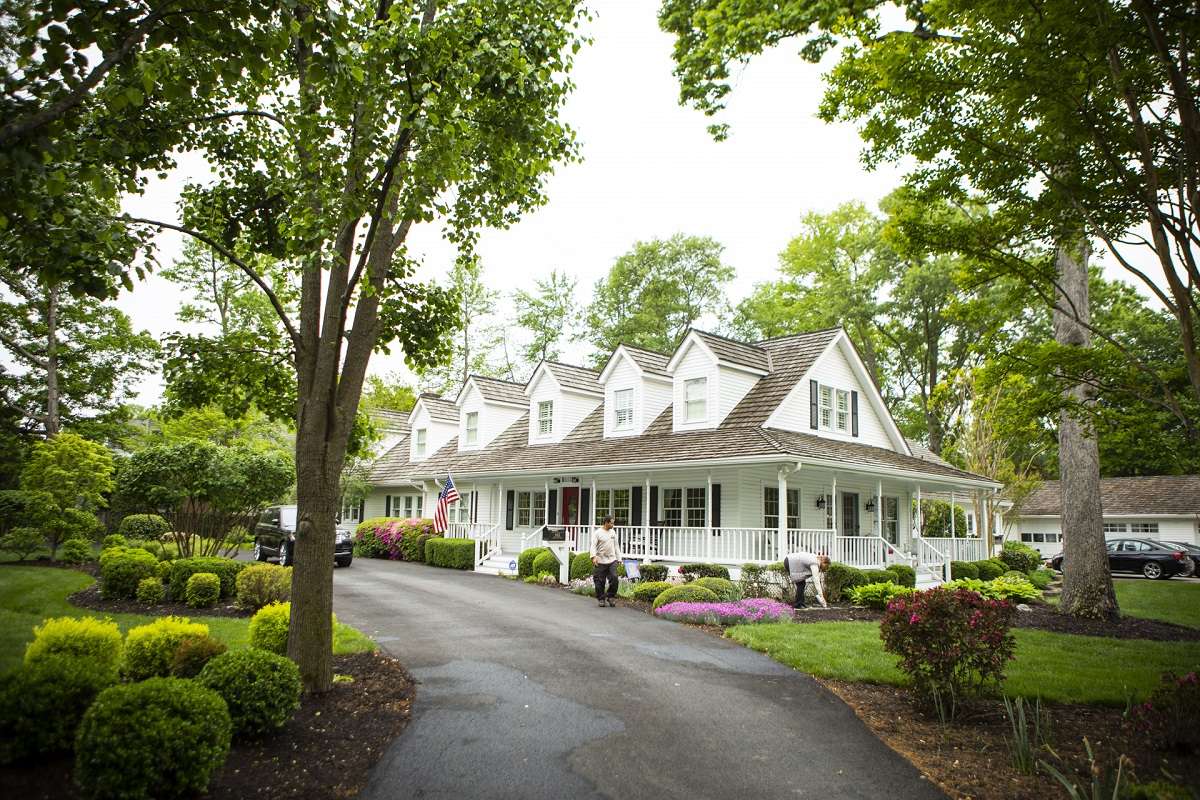


Mosquitoes, fleas, and ticks are tiny pests that can cause big trouble on your Northern Virginia property. Not only are they a nuisance, causing itchy or painful bites, but they can also carry and transmit potentially dangerous diseases.
That’s why you want to know how to keep mosquitoes, ticks, and fleas out of your yard.
We believe you deserve some peace of mind when you and your family (including the furry, four-legged members) are spending time outside. You shouldn’t have to worry about these pests putting a damper on that time.
In this guide, we’ll talk about how to get rid of mosquitoes, ticks, and fleas in your yard so that you can get back to enjoying time outdoors without the worries. We’ll help you to better understand what you’re dealing with and talk about some of the best strategies to keep these pests away.
Once you’ve read this, you will have a clearer understanding of the issue and also have actionable steps to get rid of mosquitoes, ticks, and fleas in your yard.
If you’ve dealt with mosquitoes on your property, you might feel like you’re (unfortunately) familiar with this pest. But we wanted to put together some facts about mosquitoes so that you can have a better understanding of exactly what you are dealing with.
Understanding more about mosquitoes in Northern Virginia can help you to make wise choices and get this pest under control.
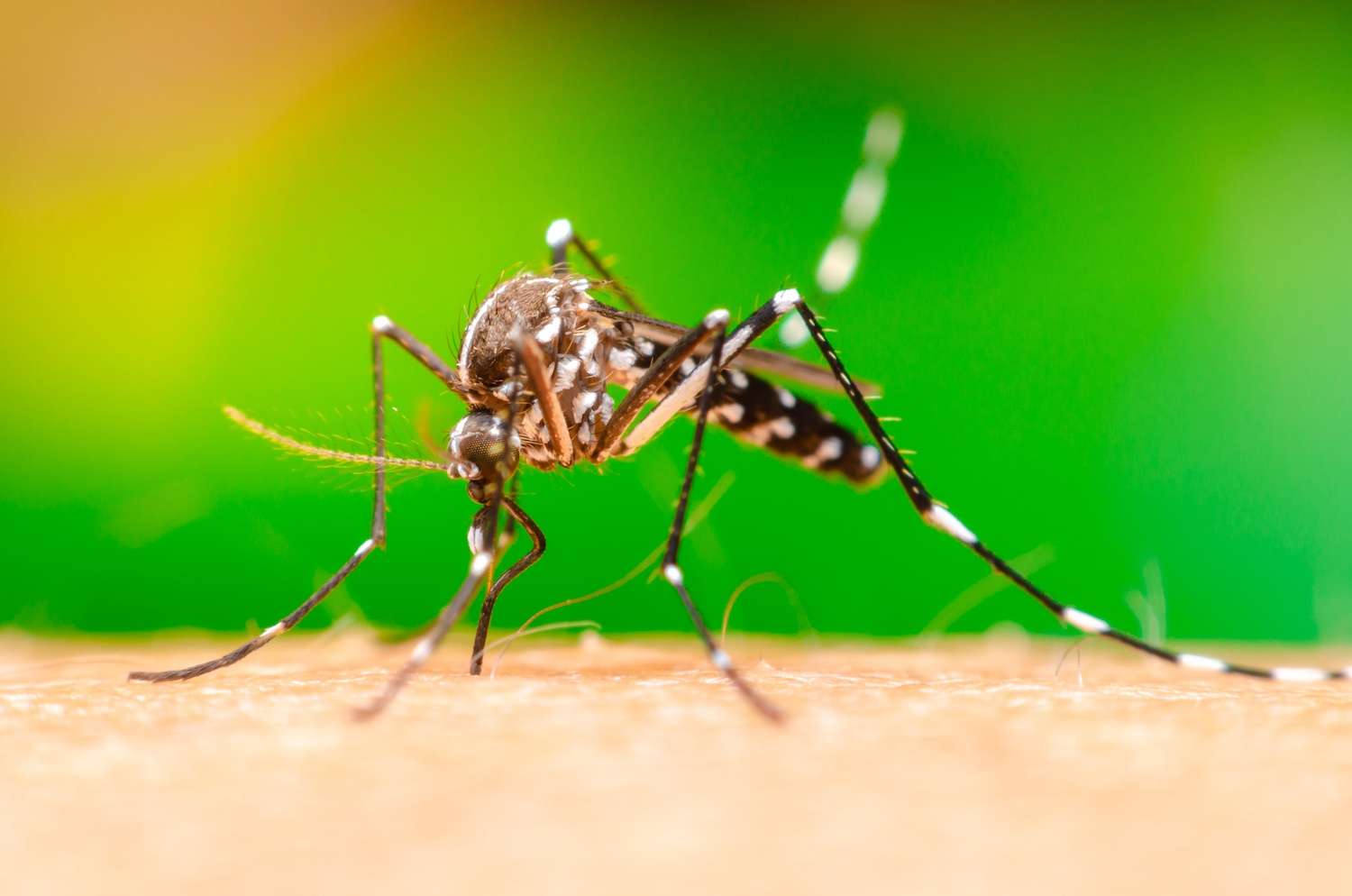
Mosquito season in Northern Virginia typically runs from April through the late fall, though it all depends upon the weather. As you might have guessed, mosquitoes do tend to prefer a warmer climate.
For most species of mosquitoes, their activity level is highest during dusk hours. The heat of the sun during the middle of the day is just too much for these pests and they are out less frequently during this time.

Unfortunately, the dusk hours are likely when you are sitting on your patio for dinner or drinks (or watching the kids play in the yard), so this is a time when you certainly don’t feel like dealing with these pests. Of course, the Asian tiger mosquito is an exception and a common problem here in Northern Virginia. This species is widespread in our region and tends to bite during the day.
Water is an important part of the mosquito lifecycle but it’s not about drinking it, as you might have thought. Water is needed for egg-laying purposes. Mosquitoes will lay eggs in standing water. Newly hatched mosquitoes (called “wigglers”) will then spend their first 10 days within the water where they feed on organic matter from it.

The key here is “stagnant” water. If the water is flowing, it is not likely to become an egg-laying site.
People are often surprised to learn that only female mosquitoes drink blood. The reason for this is that they need the blood meal in order to be able to produce eggs. Blood is full of protein and amino acids, all of which are important for producing baby mosquitoes.
A blood meal can come from humans or other mammals, birds, reptiles, or even amphibians. Research has indicated that mosquitoes consume around 3 milligrams of blood with each feeding.
Of course, blood isn’t the only meal that mosquitoes will eat. They also search out plant nectar for sugar and nourishment. This is the primary food source for male mosquitoes who may not drink your blood but tend to still be a nuisance, buzzing around and landing on people (more out of curiosity than anything).
Of the facts about mosquitoes, this is the one that often comes up as a trivia question—and it tends to surprise people. When you think of the world’s deadliest animal you probably think of a shark or maybe a big cat like a tiger or a lion. In reality, it is the mosquito.
According to the Centers for Disease Control (CDC), the mosquito kills more people than any other creature in the world. This is all because of the female mosquito (explained above) drinking blood. When doing so, the mosquito can also transmit deadly diseases like West Nile, Malaria, Dengue, Zika, Lymphatic Filariasis, and more.
Knowing what you do about mosquitoes in Northern Virginia now, you might want to know why they would end up in your yard in the first place. Mosquitoes are constantly in search of good breeding sites so areas of stagnant water, including clogged gutters, are going to end up being prime sites for them.

There are also certain conditions that they prefer such as shaded areas and places to hide. Prime mosquito hang-out areas would be tall grasses, shrubs, areas under decks, and other spots where they can stop and rest. A lesser-known fact about mosquitoes is that they are weak fliers and stop often to rest.

Ticks in Northern Virginia are another concern and for good reason. Like mosquitoes, ticks can cause painful and nasty bites. They can also carry and transmit deadly diseases.
These facts about ticks should help you have a better understanding of this troublesome pest.
According to some information from the government page for the city of Alexandria, there are three primary ticks found in our area:
Black Legged Tick (commonly called a “Deer Tick”)
American Dog Tick
Lone Star Tick
Ticks are arachnids and close relatives of spiders. The typical lifecycle of a tick is one to two years and there are four stages of growth. This includes the egg stage, larvae stage, nymph stage, and then the adult stage.
Ticks can actually be encountered throughout the year in Virginia as our winters aren’t always terribly cold. However, the prime tick season here in Northern Virginia is generally the spring and the summer. Ticks do prefer habitats with at least 85 percent humidity.
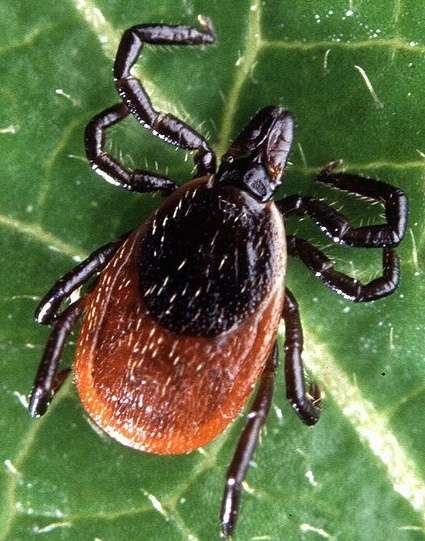
Ticks prefer habitats in which they can hide. This includes tall grasses, brush, shrubs, and wooded areas. Any spot on your property that backs up to a wooded area or a field could be a prime tick zone. They also live under leaves and plants, in groundcover, and in and around woodpiles. Since ticks commonly feed on mice or deer, if you have these other animals passing through your yard, they can easily leave ticks behind.
It is a misconception that ticks can jump, fly, or even fall from trees. Ticks crawl and climb. If you have a tick in your shrubs, it could crawl onto you (or a loved one) from there.
There are actually many diseases that can be potentially transmitted by ticks. But the ones that are most on our radar here in Northern Virginia are Lyme Disease, Rocky Mountain Spotted Fever, and Ehrlichiosis.
Unfortunately, pets can also be victims of tick-borne diseases.
The optimal habitat is what will attract ticks to a yard. As mentioned, they like tall grasses, brush, woodpiles, and other hiding spots. While some of this can be prevented (such as keeping the grass mowed and shrubs trimmed), even with your best efforts, ticks will find some hiding spots on your property. That’s why, later in this guide, we will discuss a comprehensive control plan.
Fleas in Northern Virginia are another valid concern, perhaps more so for your beloved pets than yourself (though fleas can also bite people). Fleas are tiny (only around 1 to 3 mm in length) so they are very difficult to spot. You might be more likely to spot a problem with your pet (excessive itching) before seeing the fleas yourself.
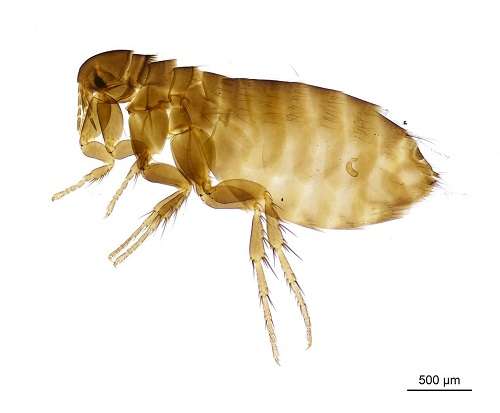
Here are a few more facts about fleas that can help you to know what you could be dealing with.
Fleas’ jumping ability is impressive for their size. Some fleas have been recorded as jumping as far as 20 inches. This means that if you have fleas in your yard, they could easily leap onto your pet.
Like the other pests we’ve talked about, fleas also need blood for their survival. In fact, fleas are one of the few pests that need blood for their entire lifespan. They utilize their piercing mouthparts to suck blood from their host. Fleas do tend to prefer animal hosts, which is what makes them a threat to your pets.

Signs that your pet might have fleas include itching or sores.
While they prefer an animal host, they can (and do) bite humans, too. However, it’s rare for fleas to “live” on humans (as they do on pets). If you find a flea bite, it’s likely your pet has fleas.
Fleas typically wind up in residential yards from wildlife that are passing through. Squirrels, raccoons, rodents, and other wildlife can drop fleas in your yard. Feral cats can also bring fleas to your yard.
Once in your yard, fleas in Northern Virginia will find an optimal habitat to take up residence. Similar to the other pests, fleas may hang around woodpiles, in tall brush, and around shrubs.

Now that you understand a bit more about these pests, you probably want to know how to keep mosquitoes, ticks, and fleas out of your yard in the first place. While there is no 100-percent foolproof solution, there are definitely steps that you can take to get rid of mosquitoes, ticks, and fleas in your yard.
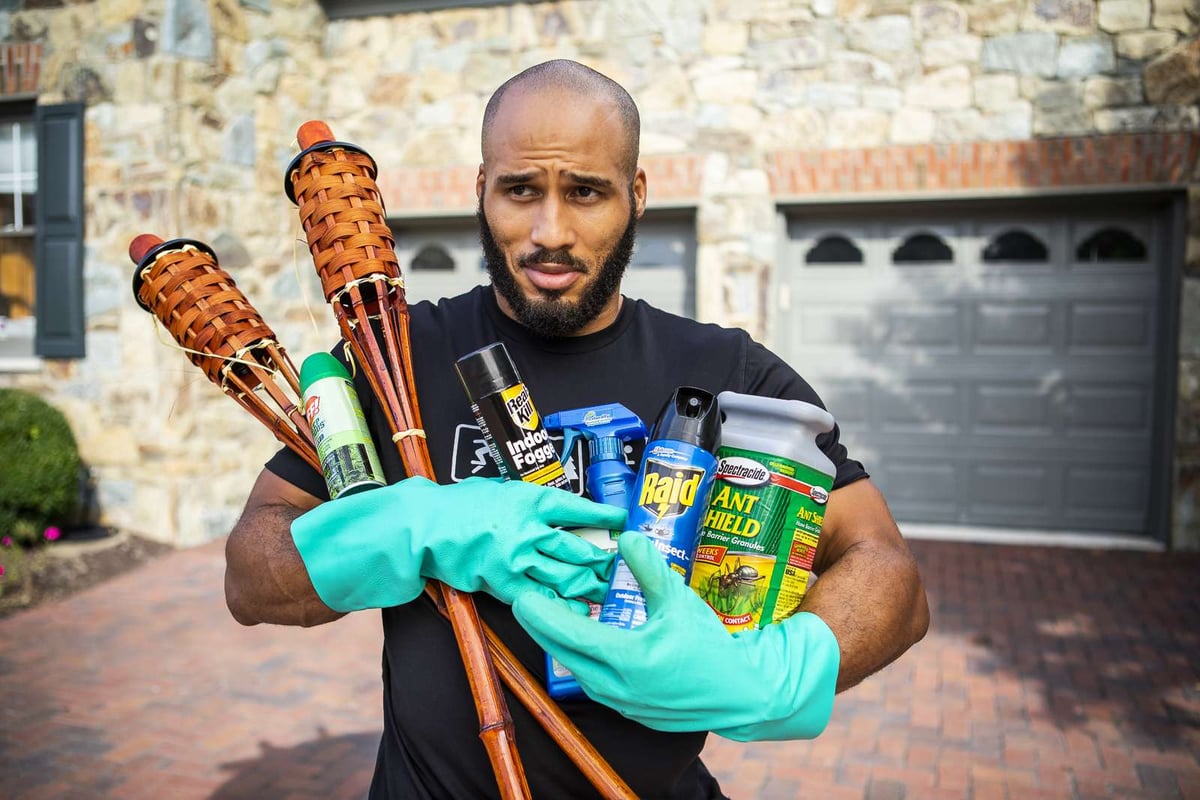
First and foremost, it’s important to recognize that there are many remedies out there, but they won’t necessarily all give you much success. We don’t like to see homeowners waste time or money on products or solutions that won’t work very well.
For instance, there are lots of online hacks for making sprays and various potions that are meant to repel these pests. There are also traps, candles, repellent plants, and more.
But the truth is, when it comes to a blood-thirsty pest (which needs a blood meal for survival or reproduction), these solutions are ineffective. These pests are entirely too persistent in finding a host to be repelled by a weak or cheap hack.
Fortunately, there are some solutions that will work.
One way to reduce pest populations is to make your yard less “comfortable” for mosquitoes, fleas, and ticks by modifying their habitat.
You can maintain trees and shrubs, clear yard debris, keep your grass mowed, and cover woodpiles. All of these pests definitely prefer to hide and don’t like being in the full sun, so you can make it less likely that they’ll hang around on your property with regular maintenance tasks.
Another important action is to get rid of areas of standing water that can become mosquito breeding grounds. Standing water can also attract rodents, which may be carrying fleas and/or ticks. Therefore, getting rid of standing water can be a way to keep mosquitoes, ticks, and fleas out of your yard.
Some common areas of standing water include unused flower pots, children’s toys, kiddie pools, wheelbarrows, buckets, and even low spots in the yard, which could require a drainage solution. Dump out standing water where you can.
Continuing on the importance of getting rid of standing water, clogged gutters can definitely become a prime pest site if not regularly cleaned. That’s because dirty gutters have everything that pests need to thrive (water, food like rotting leaves and bugs, and protection).
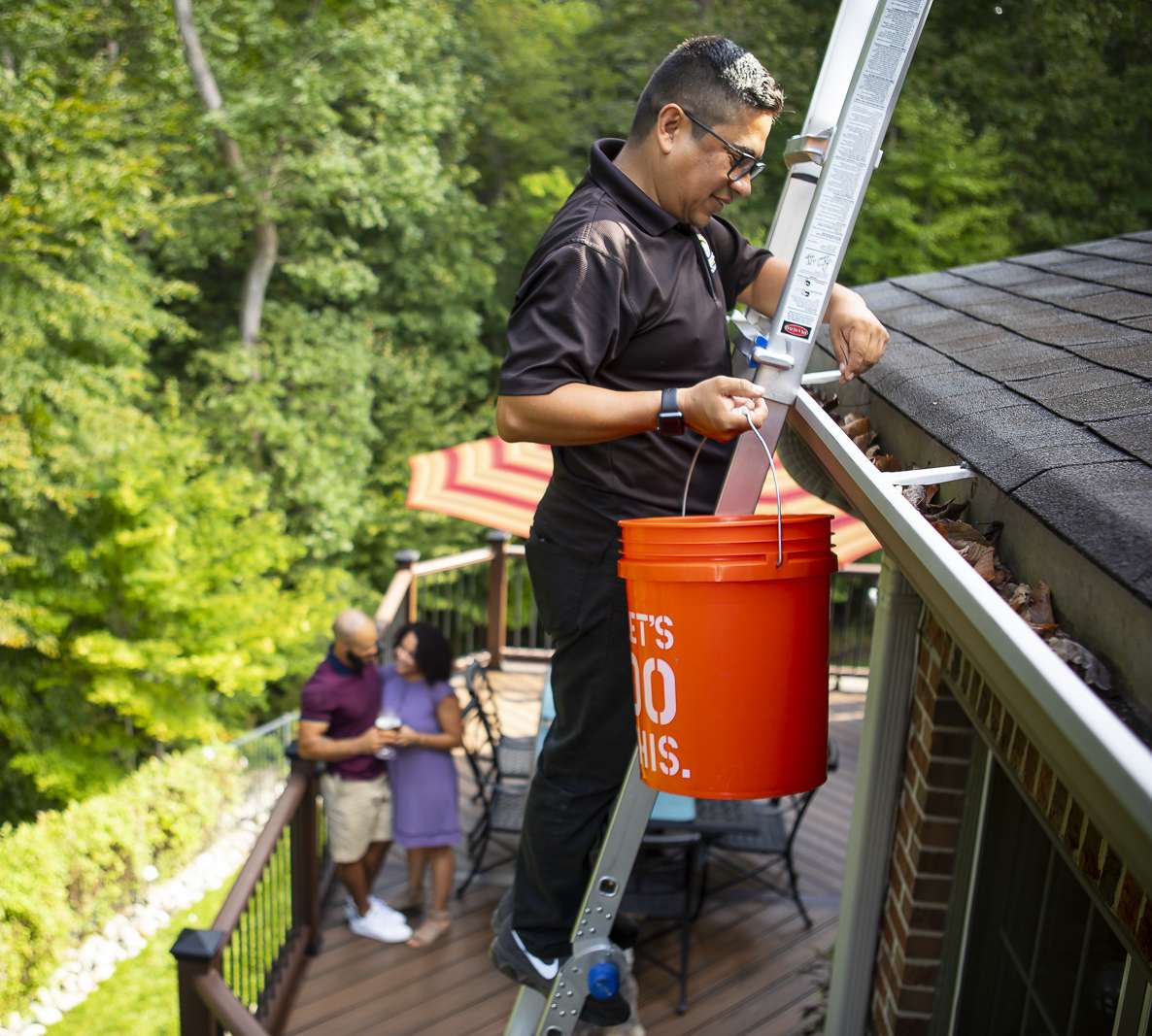
Clean your gutters regularly as a method to keep mosquitoes, ticks, and fleas out of your yard.

In addition to the above recommendations, you should also consider mosquito, tick, and flea control services.
This involves spraying your property for these pests to drastically reduce their populations. At Kingstowne Lawn & Landscape, serving in and around Alexandria, Arlington, and Springfield, VA, we bundle mosquito, tick, and flea control together (which is different from many other companies). That means our mosquito, tick, and flea yard treatment covers all three pests.
This service works by spraying mosquito, tick, and flea repellent in the areas where these pests are most likely to be hanging out. Since mosquitoes, fleas, and ticks tend to thrive in the same habitats, it makes sense to perform these services together and ensure that you are fully covered. A mosquito, tick, and flea yard treatment includes targeted applications around your property.
We know that the safety of your family and pets is imperative to you, so you might be wondering how safe a mosquito, tick, and flea yard treatment really is.
At Kingstowne Lawn & Landscape, we use a product in which the main ingredient is concentrated garlic oil. Our program also integrates a low-dose larvicide that specifically targets larvae. This means it won’t harm pets or people.
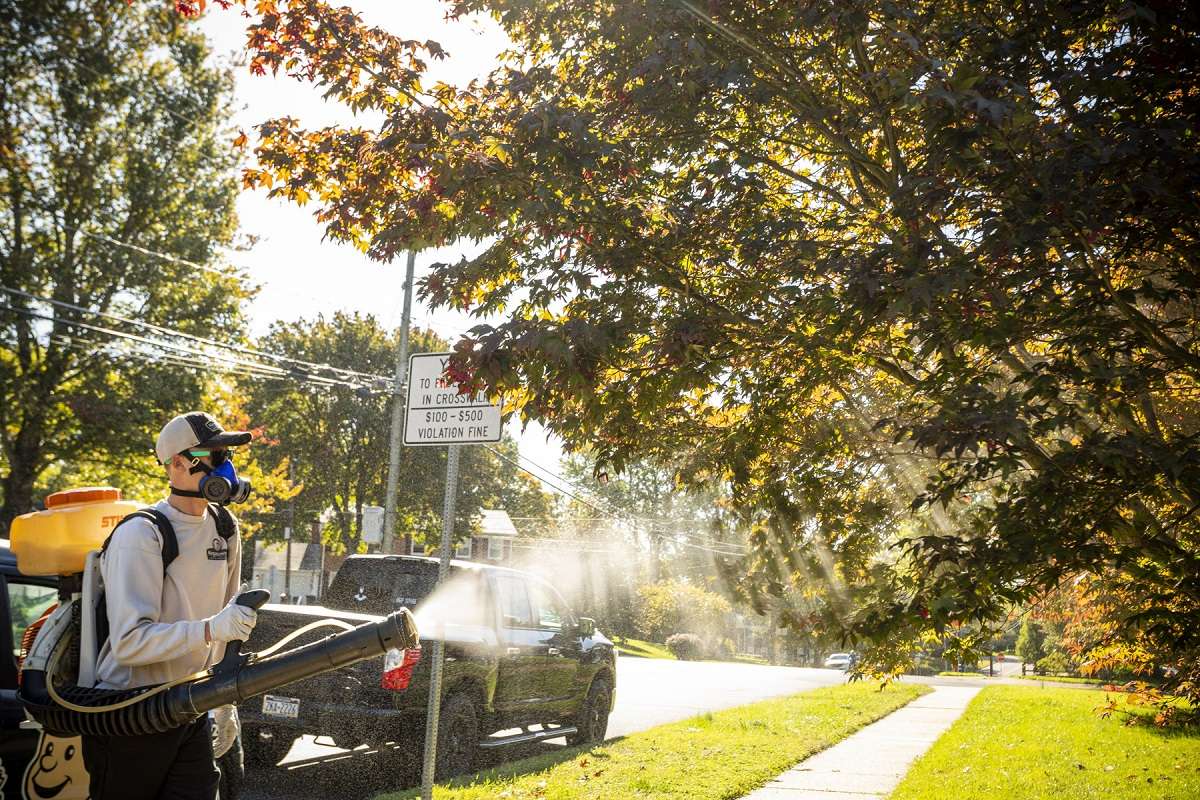
Because homeowners don’t always want to invest in mosquito, tick, and flea control services they sometimes take a DIY approach. But this is simply not going to be as effective and when it comes to these dangerous pests, you want something that works.
Fortunately, mosquito, tick, and flea control is often less expensive than people tend to assume.
For a townhome near Alexandria, Arlington, or Springfield, VA, mosquito, flea, and tick control starts at $49 per treatment. For a single-family home with a yard of 5,000 square feet or larger, the cost starts at $69 per treatment. There are 9 treatments per year from March through November, covering the prime pest season.
We perform 9 treatments throughout the entire mosquito, flea, and tick season. We do express that all 9 treatments are necessary. Because we are using a totally safe product, it does wear off over time. To keep you fully covered, we treat the property 9 times from March through November.
When it comes time to hire a mosquito, tick, and flea control service in Northern Virginia, you want to be sure to choose wisely. After all, these are dangerous pests and you want to find a company that will implement an effective (but safe) solution.
You also want to choose a company that can provide a comprehensive solution. You wouldn’t want to hire a mosquito control company that doesn’t handle fleas or ticks, and then have to find an additional service. You want to be fully covered.
As you search for pest control companies near Alexandria, Arlington, or Springfield, VA, look for those that can offer mosquito, flea, and tick control bundled into one service. Also, seek out companies that offer a safe solution that you can feel confident about.
Finally, it helps to find a company that takes a holistic approach that goes above and beyond just spraying for pests. A company that also offers gutter cleaning can make a huge difference in reducing the pest population on your property.
At Kingstowne Lawn & Landscape, we understand that you want mosquito, flea, and tick control to be simple, effective, and safe. You don't want to be worrying that you’ve solved one problem but created another because you’ve hired a company that uses a chemical you’re not sure about or has a program that doesn’t cover all your concerns.
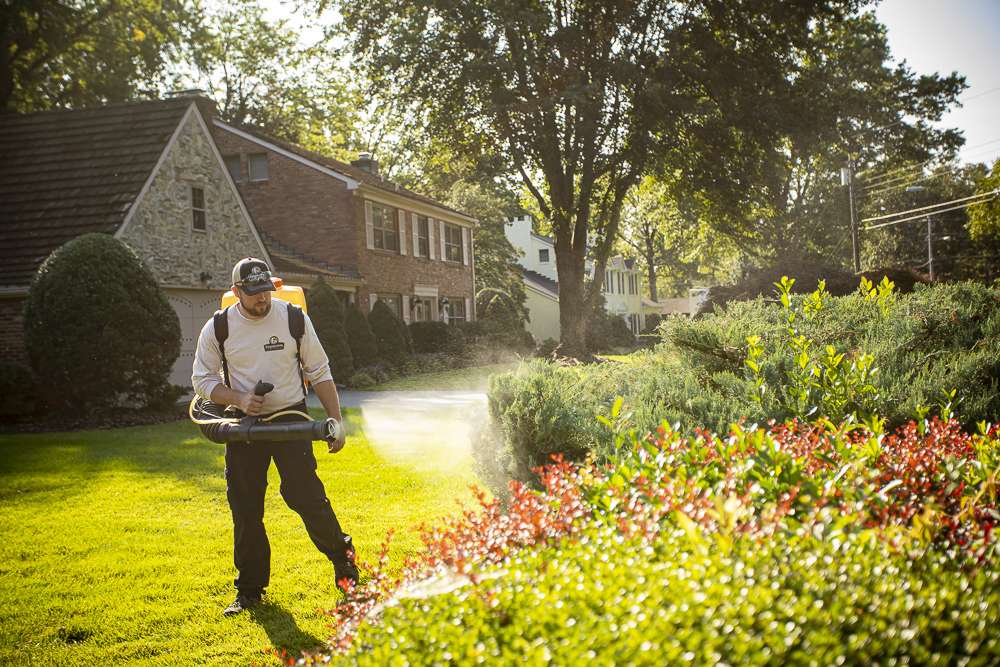
In the end, you want to make sure that you’ve chosen a company that you are happy with and that will deliver the results you’re looking for. It’s a matter of being able to spend time outside without worrying or always wondering if you’re fully covered.
When you make the wise choice in mosquito, tick, and flea control service near Alexandria, Arlington, or Springfield, VA, you can let go of your worries.
If you’re ready to stop worrying about the nuisance and dangers of mosquitoes, fleas, and ticks request a quote, get your customized plan, and sit back and relax as you get the royal treatment.

Since 1997, Krisjan has led the Kingstowne team with one simple philosophy, treat every customer like the “only” customer. His passionate pursuit of impeccable customer service has resulted in 24 successful years and a thriving company with over 85 employees, helping thousands of homeowners in the Alexandria, Arlington, and Springfield, VA area get what they want - a worry-free property they can be proud of.


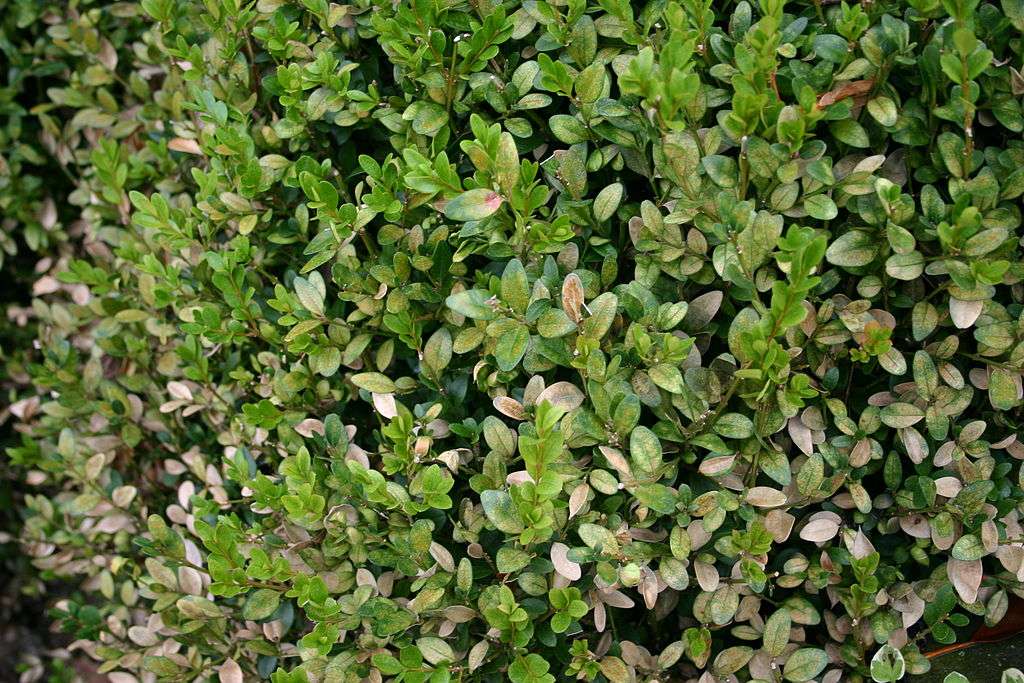

If You're Looking For a Sign, This is It.
Seriously, that lawn isn't getting any better on it's own. Mrs. Jones just called the HOA on you